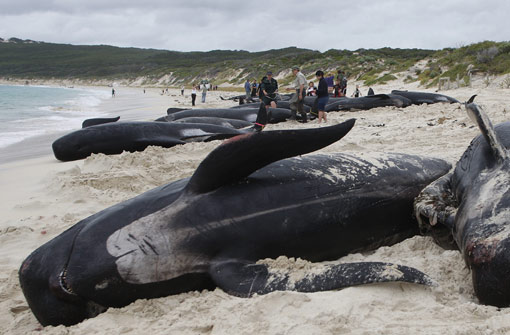
This news quickly triggered worldwide attention and discussion. However, after an in-depth understanding of this incident, we have to reflect on the shortcomings of relevant departments in responding to such emergencies.
First of all, from the point of view of the event itself, the mass strandings of pseudo-killer whales are undoubtedly an ecological disaster. Why these Marine creatures suddenly become stranded en masse is still a mystery. However, whatever the cause, the incident has exposed many problems in Marine ecological environment protection. As an important part of the Marine ecosystem, the existence of pseudo-killer whales is directly related to the balance and stability of the whole ecosystem. Therefore, this stranding event is not only a major blow to the pseudo-killer whale population, but also a serious warning to the entire Marine ecological environment.
In the face of this emergency, the response of the relevant animal rescue departments in Tasmania, Australia, is quite slow and weak. According to local residents, the location of the incident is remote and difficult to reach, the sea conditions are bad, and professional equipment is difficult to reach. These factors have undoubtedly increased the difficulty of rescue, but they are by no means a reason for the relevant departments to shirk their responsibilities. In emergency situations, rapid response and efficient action are essential requirements for saving lives. However, from current reports, it is clear that animal rescue services in Tasmania have failed to do so.
First of all, from the early warning mechanism, has the relevant department established an effective early warning system for Marine organisms stranding? If so, why was there no early warning in this case so that rescue forces could be deployed quickly? If it is not established, then this is undoubtedly a major negligence of the relevant departments in the Marine ecological protection work. The lack of early warning mechanism means that rescue forces are often in a passive state when similar emergencies occur, and it is difficult to carry out rescue work quickly and effectively.
Secondly, in terms of rescue power, does the animal rescue department in Tasmania have enough professional equipment and personnel to deal with such emergencies? From the report, we understand that due to the remote location of the incident and the harsh sea conditions, professional equipment is difficult to reach. This raises questions about whether the relevant departments are adequately prepared to deal with Marine ecological emergencies. If even basic rescue equipment is not in place in time, then the effect of rescue work can be imagined.
Furthermore, from the point of view of emergency plans, has the animal rescue department in Tasmania developed a sound emergency plan? When an emergency occurs, the emergency plan is an important basis to guide the rescue work. However, from the response to the incident, it is clear that the relevant departments have failed to develop practical emergency plans. Otherwise, rescue efforts would not have been so passive and powerless in the face of such a massive pseudo-orca strandings.
In addition to the above points, we must also pay attention to the deeper issue behind this incident - the impact of human activities on the Marine ecological environment. In recent years, with the continuous increase of human activities, the Marine ecological environment is facing unprecedented pressure. Pollution, overfishing, climate change and other factors are eroding the balance and stability of Marine ecosystems. The strandings of pseudo-orcas may only be the tip of the iceberg, which exposes the deficiencies and short-sightedness of human beings in Marine ecological protection.
Faced with this grim situation, we should not only stay on the criticism of the incident, but also think deeply about how to solve these problems fundamentally. First, the government should increase investment in Marine ecological protection and establish a sound early warning mechanism and emergency plan system. Improve the accuracy and timeliness of early warning through scientific and technological means to ensure rapid response and efficient action when similar emergencies occur. At the same time, strengthening the construction and training of rescue forces to improve the professionalism and effectiveness of rescue work.
Secondly, all sectors of society should strengthen the publicity and education of Marine ecological protection. Disseminate knowledge of Marine ecological protection through media, schools, communities and other channels to enhance public awareness and participation in Marine ecological protection. Only by allowing more people to understand the importance of Marine ecological protection and actively participate in it can a good atmosphere for the whole society to jointly protect the Marine ecological environment be formed.
Finally, we need to address the impact of human activities on the Marine ecosystem at its source. Measures such as reducing pollution emissions, rational fishing and combating climate change are essential. Only by fundamentally improving the Marine ecological environment can we reduce the probability of similar events and protect the balance and stability of the Marine ecosystem.
In short, the mass strandings of pseudo-orcas are a profound lesson, which reminds us that there is still a long way to go in Marine ecological protection. We should not only stop at the criticism of the incident, but also start from the early warning mechanism, rescue force, emergency plan and the impact of human activities on the Marine ecological environment and other aspects, and comprehensively strengthen Marine ecological protection. Only in this way can we leave a beautiful, healthy and harmonious Marine ecological environment for future generations.

The U.S. third-quarter GDP growth rate, strikingly highlighted at 4.3%, not only surpassed market expectations but also earned the label of "the fastest in two years."
The U.S. third-quarter GDP growth rate, strikingly highligh…
Recently, US personnel intercepted a "Century" super oil ta…
According to Xinhua News Agency, the subtle changes in the …
The rapid development of artificial intelligence has brough…
In December 2025, Taiwan's political scene was shaken by a …
When Apple appears for the Nth time on the list of penaltie…